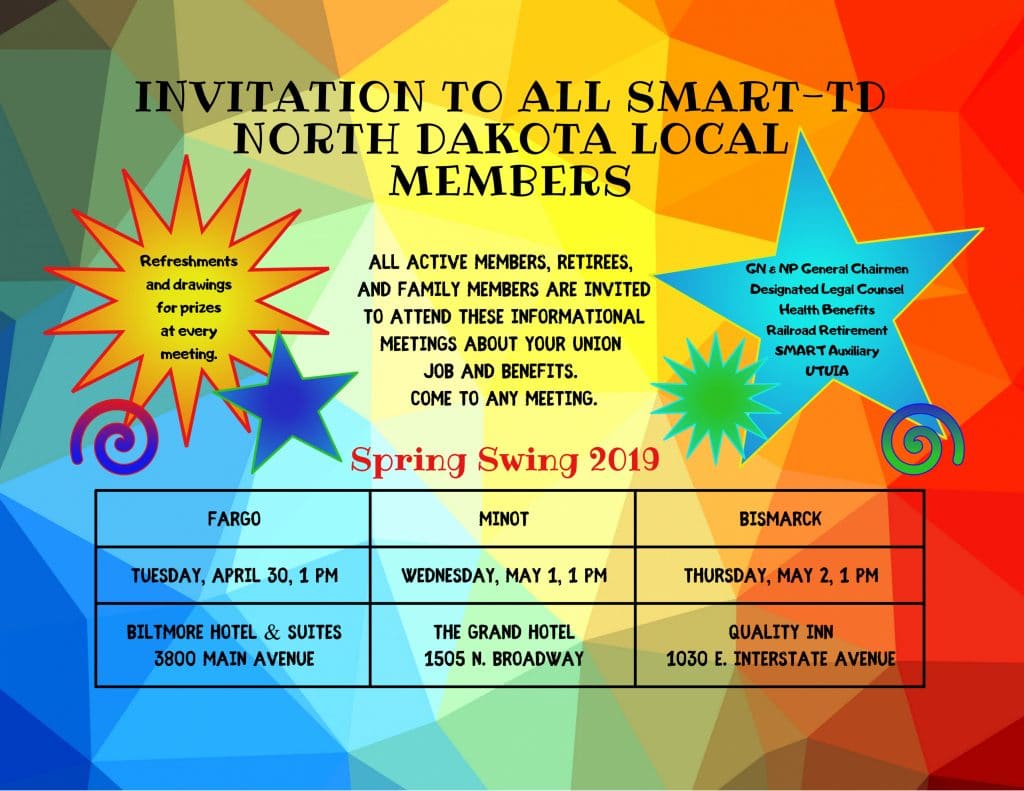BNSF announced on Wednesday in a letter to employees that three maintenance shops will be closed in Montana and Wyoming, while additional mechanical department job cuts will occur in Alliance and Lincoln, Neb.; Mandan and Minot, N.D.; Topeka, Kan.; and Superior, Wis.
“In total, approximately 19 salaried and 344 craft positions will be impacted,” the carrier stated. “These adjustments come as the result of long-term structural market changes, most notably in the coal and energy sector, and reduced demand for freight transportation services at the impacted locations.”
The Donkey Creek, Wyo., shop is scheduled to close June 5 while the facilities in Glendive, Mont., and Guernsey, Wyo., are scheduled to close July 7.
The Wyoming facility closures will result in 122 jobs lost. In Topeka, 28 jobs will be cut.
“Closing our facilities and reducing jobs in communities where we’ve had a long-lasting presence is a difficult but necessary decision,” the carrier said.
Follow this link for more details about the layoffs.
Tag: North Dakota
North Dakota locals will be holding informational meetings for their members on April 30 in Fargo, May 1 in Minot, and May 2 in Bismarck.
These meetings provide an exceptional opportunity to learn about your benefits and visit with union officers and representatives from the Railroad Retirement Board, UTUIA, health care and other insurance plans as well as SMART TD Designated Legal Counsel.
All members, retirees, and spouses/significant others are welcome to attend any of the meetings. There is no registration; just come if you can.
For further information, call State Legislative Director Jim Chase at 701-223-0061 or email utu4nd@gmail.com.
Here is the schedule:
- Tuesday, April 30, 1 p.m.
Biltmore on Main Hotel & Suites
3800 Main Ave., Fargo
. - Wednesday, May 1, 1 p.m.
Grand Hotel
1505 N. Broadway Ave., Minot
6 p.m. Social & 7 p.m. Annual Retirement Banquet
. - Thursday, May 2, 1 p.m.
Quality Inn
1030 E. Interstate Ave., Bismarck
North Dakota locals will be holding informational meetings for their members the last week in April. These meetings provide an opportunity to learn about your benefits and visit with international officers, general chairmen, and representatives from the Railroad Retirement Board, UTUIA, healthcare and other insurance plans, the Auxiliary of the UTU and Designated Legal Counsel.
All members, retirees, and spouses/significant others are welcome to attend any of the meetings. There is no registration; just come if you can. For further information, call North Dakota State Legislative Director Jim Chase at 701-223-0061 or send an email to utu4nd@gmail.com.
- Local 1344: BNSF
Tuesday, April 25, 1:00 p.m.
Baymont Hotel, 2611 Old Red Trail NW, Mandan - Locals 887 & 980: CP Rail
Wednesday, April 26, 1:00 p.m.
West Fargo VFW, 308 Sheyenne St., West Fargo - Locals 525 & 1137: BNSF & RRVW
Thursday, April 27, 1:00 p.m.
Country Inn & Suites, 3316 13th Avenue S., Fargo - Local 1059: BNSF
Friday, April 28, 1:00 p.m.
The Vegas Motel, 2315 N. Broadway, Minot
Local 1059 will follow up their Spring Swing meeting with a social at 6:00 p.m. and annual retirement banquet at 7:00 p.m. All events will be held at The Vegas Motel.
Both inspectors for a state rail safety program — aimed to prevent such fiery derailments involving crude oil as happened this year near Weimdal, N.D. — have been hired and are training with federal inspectors.
In July, an agreement was approved by the Public Service Commission with the Federal Railroad Administration to begin a pilot rail safety program in the state. The program is to supplement the work of the several FRA inspectors assigned to North Dakota and several other states in the region.
Read more from The Bismarck Tribune.

A spokesperson for BNSF, the railroad involved in the derailment, told NGI‘s Shale Daily on Tuesday that the National Transportation Safety Board (NTSB) continues to investigate the May 6 accident, and the company is prevented from disclosing “any information that is germane” to the investigation.
In Washington, DC, an NTSB spokesperson said a final report, including identifying the cause of the incident, is likely to take up to a year, but some interim reports may be issued. NTSB’s Jim Southworth has been the investigator-in-charge.
Read more from NGI’s Shale Daily.

Lawmakers adopted a scaled-down version of a program proposed by the Public Service Commission and Gov. Jack Dalrymple in the Public Service Commission budget, Senate Bill 2008.
Read the complete story at www.inforum.com.

Proposed standards announced Thursday by the state Department of Mineral Resources follow a series of fiery rail accidents over the last 18 months that have made ballooning number “crude by rail” shipments highly controversial across the country.
Read the complete story at
North Dakota locals will hold their annual Spring Swing meetings April 23-25, State Legislative Director James M. Chase reports. These meetings provide an excellent opportunity to learn about your benefits as a member and to visit with SMART Transportation Division officers, general chairpersons and representatives from UTUIA, the Railroad Retirement Board, designated legal counsel and health-and-welfare benefit providers.
All members and their spouses are welcome to attend any of the three meetings and lunch will be served at the conclusion of each meeting. For further information, call (701) 223-0061 or send email to utu4nd@gmail.com. The schedule is as follows:
•Wednesday, April 23, Locals 887, 980, 1137 and 1137-RRVW; 1 p.m. meeting at the Fargo Howard Johnson Inn at 301 3rd Ave. N., in Fargo; (701) 232-8850.
•Thursday, April 24, Local 525; 2 p.m. meeting at the Hilton Garden Inn, 4301 James Ray Dr., in Grand Forks; (701) 775-6000.
•Friday, April 25, Local 1059; 1 p.m. at the Vegas Motel, 2315 N. Broadway Ave. in Minot; (701) 839-3000.

Jim Chase, North Dakota State Legislative Director of the SMART Transportation Division, submitted the following letter to the editor of The Bismarck Tribune. It was published Feb. 28, 2014.
Since the 1880s, North Dakota’s railroads have played an essential role in developing our state and our economy. Today’s railroads continue to provide vital passenger service and freight transportation across our state, and in the past two years have been the primary way we ship Bakken crude oil to market.
Without rail transportation, we would not have an oil boom in North Dakota today. And we would not have the incredible state budget surpluses we use to fund all sorts of worthy things.
Amtrak, our state’s only rail passenger service provider, has been providing that service since 1970. A recent statewide survey conducted on behalf of our union, SMART-Transportation Division (formerly the United Transportation Union), found that a strong majority of North Dakotans are very supportive of 1), Amtrak and 2), taking action to assure railroads continue to operate safely.
North Dakotans are not alone in their support for Amtrak; nearly identical poll results across the country reflect its growing popularity.
Ridership is at an all-time high, reaching 31.6 million last year. Indeed, one of the only places where Amtrak is not enjoying increasing favor is Washington, D.C., where some congressional leaders are still pushing to de-fund or privatize Amtrak. It is a position clearly out of step with Americans of all political persuasions.
With Congress preparing to rewrite the law that governs Amtrak and rail safety legislation, now is the time for elected officials to listen to their constituents and provide adequate funding for Amtrak to ensure that our nation’s railroads operate at the highest levels of safety. Seventy-one percent of North Dakotans favor federal legislation requiring a minimum of two-person crews on trains, which is one of the most effective ways to prevent accidents.
In the past, Amtrak was never a partisan issue. In fact, Amtrak had no greater friend and supporter than former Republican U.S. Senator Mark Andrews of Casselton, N.D. And as current polling across the country shows, Republicans, Democrats and Independents alike strongly support Amtrak in almost equal numbers.
Rail safety has taken on more urgency in the wake of several deadly train accidents in the last year. Last July, a single-person crew left a train unattended and it rolled away, destroying the center of a town in Quebec and killing 47 people. Other recent deadly passenger train accidents in Spain and New York occurred with only one person in the locomotive cab.
North Dakota recently had its own newsworthy train accident just west of Casselton, when a train carrying crude oil collided with another train carrying soybeans. Several cars became derailed and burned. Thankfully, both trains had more than one crew member on board who were able to respond to the situation, with no loss of life.
Every one of the accidents just described illustrates the need for a minimum of two persons on a train crew; however, requiring two-person train crews must be legislated. The railroads would prefer zero crew members on a train and want the power to reduce their train crews to the bare minimum at their personal discretion. Safety is our biggest concern; profit is theirs.
Congress can help secure safe rail service across our country by adequately funding Amtrak and by passing The Safe Freight Act, HR3040, a bill to require every freight train to have two crew members on board.
We as North Dakotans rely on freight rail to transport our Bakken crude oil and farm commodities to market, and we rely on Amtrak as an essential passenger transportation option. North Dakota depends on having safe rail service.

“We’ll want to know if it was the actual cause of the derailment, or was it broken during the derailment?” National Transportation Safety Board member Robert Sumwalt said.
Read the complete story at the San Francisco Chronicle.
